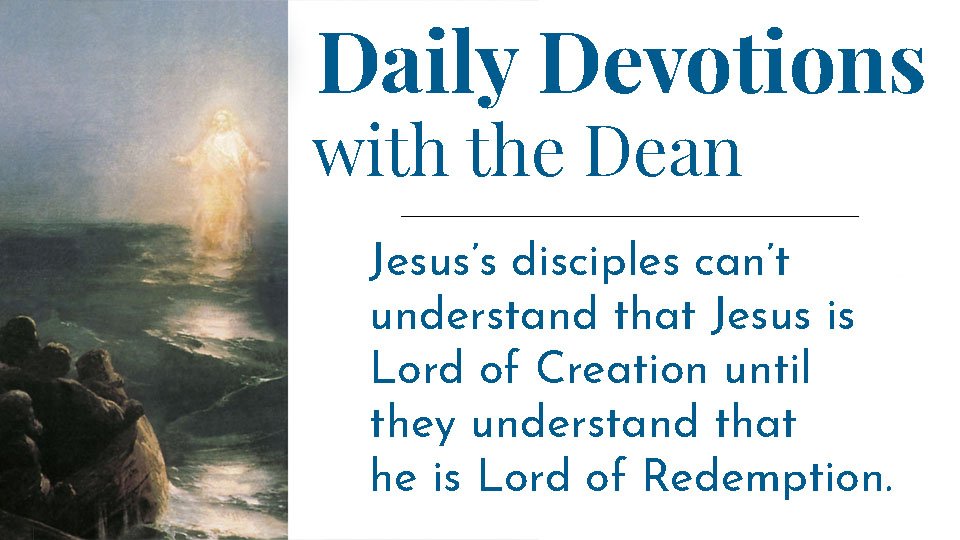Monday • 2/3/2025 •
Week of 4 Epiphany
This morning’s Scriptures are: Psalm 56; Psalm 57; Isaiah 51:17–23; Galatians 4:1–11; Mark 7:24–37
This morning’s Canticles are: following the OT reading, Canticle 9 (“The First Song of Isaiah,” Isaiah 12:2–6, BCP, p. 86); following the Epistle reading, Canticle 19 (“The Song of the Redeemed,” Revelation 15:3–4, BCP, p. 94)
Welcome to Daily Office Devotions, where every Monday through Friday we explore that day’s Scripture readings, as given in the Book of Common Prayer. I’m Reggie Kidd. Thanks for joining me. This is Monday of the fourth week of Epiphany, and we are in Year 1 of the Daily Office Lectionary.
Throughout his fifty-first chapter, Isaiah piles up images of the good things that Yahweh is doing for his people Israel, and through them for all creation. Isaiah foresees in his people’s release from bondage a return to the innocence of Eden, “the garden of the Lord” (Isaiah 51:3). The wonderful expansion of God’s people from “one” to “many” that they saw under Abraham and Sarah (the only mention of Sarah in the Old Testament outside of Genesis) will happen all over again (Isaiah 51:2). Indeed, just as Yahweh had promised that all the nations would be blessed through Abraham, now the (pagan) “coastlands wait for me, and for my arm they hope” (Isaiah 51:5). The new exodus that lies ahead will imitate the first exodus’s destruction of evil in the waters of the Red Sea (the demonic spirit-powers Rahab/Leviathan*—compare Job 3:8; 26:12; 41:1; Psalm 74:14; 89:10; Isaiah 27:1). The result is an entire creation being made new, “for the heavens will vanish like smoke … but my salvation will be forever, and my deliverance will never be ended” (Isaiah 51:6).
To these images, Isaiah adds yet one more. He depicts Israel as staggering about under the weight of her torments, having “drunk at the hand of the Lord the cup of his wrath, [and having] drunk to the dregs the bowl of staggering” (Isaiah 51:17). The prophet sees that the severity of Yahweh’s discipline has left his people beleaguered, dispirited, and despondent. In his mercy, though, now Yahweh says, “See, I have taken from your hand the cup of staggering; you shall drink no more from the bowl of my wrath” (Isaiah 51:22). Yahweh wants his people to know that their destiny is not one of despair. Instead, their lot is to serve as the fulcrum for the release of all the world from its captivity to sin and sickness, disease, dejection, and death.
Image: "In The Garden of Eden" by mysza831 is licensed under CC BY 2.0
Mark. In Isaiah 51, Yahweh puts that cup of wrath into the hands of Israel’s earthly oppressors (the nations who have been mistreating her). In the New Testament, Yahweh comes in person to the earth he created and loves; he comes to drink the cup himself. Jesus will ask the sons of Zebedee, “Are you able to drink the cup that I drink?” (Mark 10:38). So horrible is the anticipation of that cup—not the mere fact of death, but death-as-undergoing-the-wrath—that in the Garden of Gethsemane, Jesus pleads, “Father, if you are willing, remove this cup from me; yet, not my will but yours be done” (Luke 22:42). Fortunately for us, Jesus included the “if” and the “yet.” And so, the Father permits his dear Son’s drinking of the cup of wrath, that we might rise with him to sobriety, to sanity, to salvation, and to strength.
In Mark’s Gospel, Jesus is walking out the fulfillment of the promises made in Isaiah. Jesus travels west into non-Israelite territory to Tyre on the Mediterranean coast. There he finds exactly what Isaiah predicted: “coastlands wait for me, and for my arm they hope.” Jesus responds to the persistent faith of a pagan mother and delivers her child from demonic oppression (Mark 7:24–30). Then he goes east of the River Jordan—again, into non-Israelite territory—and performs the messianic acts that Isaiah had prophesied: “he even makes the deaf to hear and the mute to speak” (Mark 7:37; and see Isaiah 35:5–6).
The conquering lion is on the loose, and the cup of the wine of wrath is about to be replaced with the cup of blessing. Eden is being restored. Israel is once again rising to her call to bless the nations. Evil is on the run.
Be blessed this day,
Reggie Kidd+













